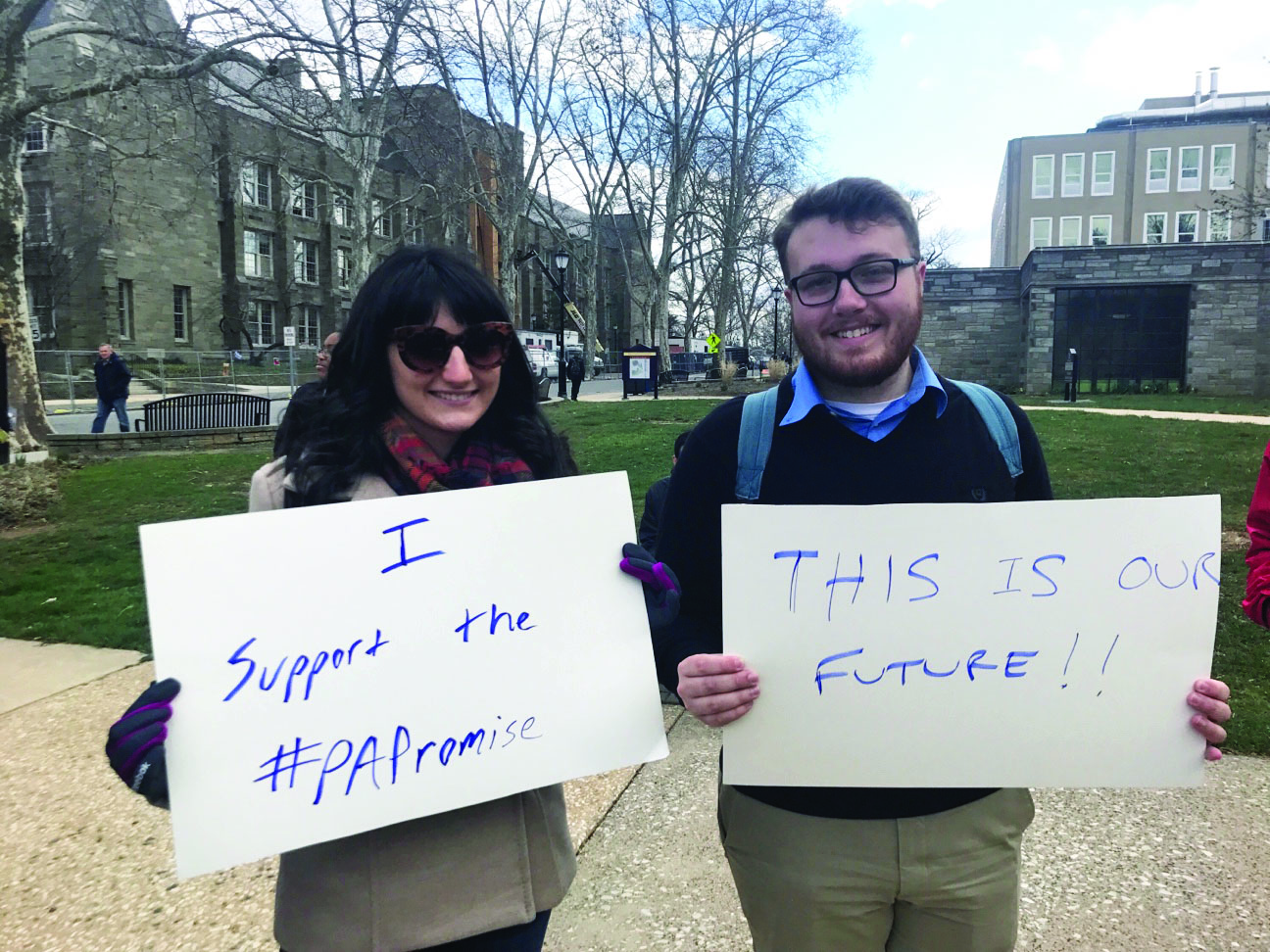Thursday, April 5 marked PA Promise’s first-ever rally to stand up and fight for more affordable higher education within the Commonwealth of Pennsylvania. The rally aimed to bring awareness to the current inaccessibility of affordable post-secondary education as well as the increasing issues stemming from insurmountable student loan debt.
PA Promise is a proposal that outlines four potential pieces of legislation to provide access to quality higher education, aiming to cut down on the high financial burdens currently befalling students. The act proposes to cover tuition and fees for a recent high school graduate’s first two years at a community college within the state, or all four years at a university within the Pennsylvania State System of Higher Education (PASSHE) system if the student’s annual family income is equal to or less than $110,000. Additionally, it proposes offering grants for students attending state-related universities such as University of Pittsburgh or Temple University and to adults seeking “in-demand skills and industry-recognized credentials,” according to their website.
The rally, which took place outside Ehinger Gym, was attended by students and faculty members who shared in the desire to fight for more affordable post-secondary education options. According to Business Insider, the average amount of student loan debt in Pennsylvania is among the nation’s highest at $24,600; this is over twice the amount in states like California and Arizona.
APSCUF— the Association of Pennsylvania State College and University Faculties which is one of the rally’s partners—had a table set up, distributing signs for students to hold as well as registering new voters. Speakers including state representatives, faculty members and students took the mic over the course of the rally. Professor Mark Rimple, president of the local chapter of APSCUF, kicked off the rally by talking about the potential impact of PA Promise: “We should be able to bring people upward. And what this plan will do—it’s the beginning of a conversation and a movement … This is the first phase to help the bottom of our society achieve better wealth and better living.”
After Rimple gave his introduction, APSCUF State President Ken Mash approached the mic, outlining some statistics regarding PASSHE. “Pennsylvania is 47 out of 50 states when it comes to per capita funding for public higher education,” he said. “U.S. News & World Report ranked Pennsylvania 50th when it comes to higher education—and that wasn’t because of the quality of our universities, that was simply because of the cost and the debt burden that’s placed on students. Something has got to give in our commonwealth,” he continued.
Mash finished his piece by reminding attendees that state Sen. Vincent Hughes is planning on introducing a bill to the House of Representatives regarding some of the legislation proposed by PA Promise.
Next up to the mic was state Rep. Carolyn Comitta, an alumna of West Chester University, class of 1974, followed by her colleague, state Rep. Duane Milne. Milne reflected on his own experience with student loan debt: “Our debt was not what I see this current generation facing … I feel bad sometimes, when I look at the kind of figures that I see students in my classes trying to absorb.”
Milne mentioned that a large issue with student loan debt is its effect on students’ post-college career choices. He stated that debt should not have to factor into a student’s decision to work in a lower-paying field such as “public service, social work, teaching, government work,” and so on.
“Proud APSCUF member” and state Sen. Andy Dinniman shared his thoughts on PA Promise. Dinniman outlined education’s function over the years: In an agricultural society, “going up to the eighth grade was considered the appropriate amount of knowledge”; in the industrial age, it was twelfth grade. Now, moving into the technological age, it’s higher education. He finished, “What you’re doing is new, and yet it has a history to it, and is also reflective of the changes of the economy and technology of the time.”
From there, Professor Seth Kahn read aloud a few submissions he received from WCU alumni regarding how their own student loan debt has affected their lives. Many shared the sentiment that without the high debt, they could have put a down payment on a home, bought or leased a car, started saving or created a retirement fund and for those who had to quit school prematurely due to their debt, they articulated that they could have finished their degree. One alumni wrote saying, “My loans feel like a ticking time bomb.”
In addition to the speakers previously mentioned, a few students shared their own testimonies. One of them, Marques Peacock, is a second-year student and member of Pennsylvania Student Power. He stated, “It wasn’t until recently I started thinking about how much debt I’m in and started calculating it … it’s not hundreds, it’s not thousands—we’re talking tens of thousands of dollars that I’m already in debt and it’s only my second year of school.” On his struggle with student loan debt, Peacock said, “It’s fighting an uphill battle, or trying to climb a wall—it’s almost impossible.”
After the rally concluded, Comitta made a few more remarks during a one-on-one interview, reiterating her stance on making education more widely affordable since “young people are the future.” She stated, “The young people who can’t afford to be here need to be here anyway, and it is our responsibility to make sure they have that opportunity.”
To learn more about PA Promise or to get involved, you can visit PApromise.org.
Lauren Detweiler is a fourth-year student majoring in English writings with a minor in communication studies. ✉ LD838069@wcupa.edu.

